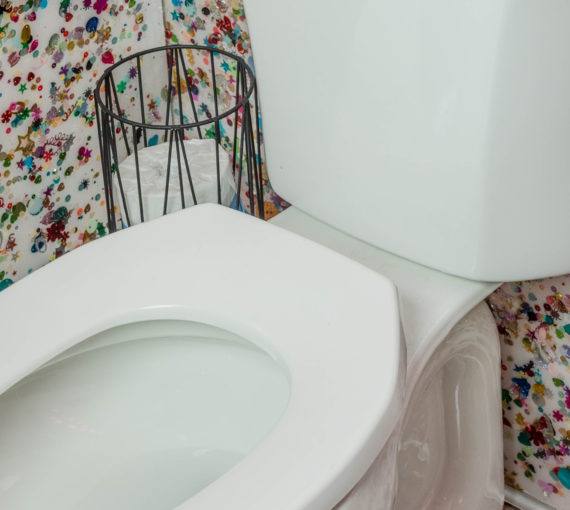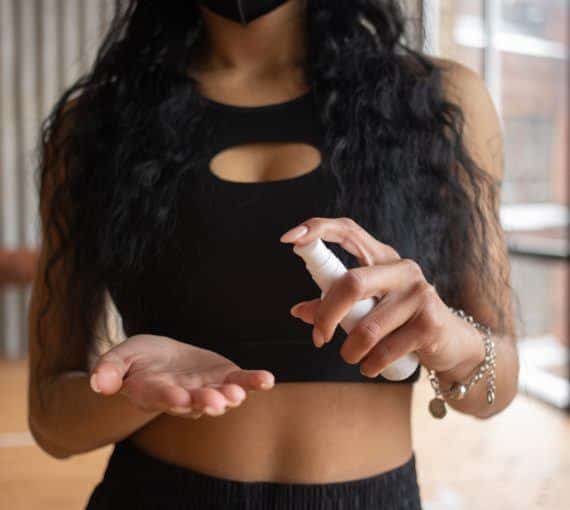
Eco-minded sex is better for you and the planet so consider G- (for “green”) rating your most intimate moments. (Photo: Ketut Subiyanto via Pexels)
Eco-minded sex is better for you and the planet!
Before getting caught up in the excitement, consider G- (for “green”) rating your most intimate moments. Try these Earth-friendly tips.
Sexual health and barriers to access
Sex is natural. But it’s hard to integrate sustainability into intimacy.
Not everyone has equal access to safer, greener options and inclusive care. Cost, location, stigma, cultural barriers and systemic inequities can all limit opportunities. The sustainable or most non-toxic choice may not be available or affordable for everyone. This especially affects rural and low-income communities and those navigating barriers related to race, gender identity or immigration status.
Navigating these choices is often harder for marginalized groups — such as queer and trans communities and people of colour — who already face layered challenges in accessing comprehensive, respectful and affirming sexual and reproductive health care.
Promoting sustainable sexual health must go hand-in-hand with advocating for reproductive, gender and sexuality justice, health equity and systemic solutions. Reducing harm to the planet shouldn’t come at the cost of personal autonomy and wellbeing. Sustainability efforts must be systemic and centre the needs, rights and lived realities of those facing the greatest barriers.
Use non-toxic sex toys
Most sex toys contain phthalates, chemicals that make plastics flexible and harder to break. These can harm the environment and human bodies.
Studies show phthalates can disrupt the body’s hormone-regulating endocrine system. In animals, high-level exposure has been linked to reproductive and developmental problems, and immune system damage.
Some countries restrict and regulate certain phthalates due to health and environmental risks.
The greenest sex toys are made from:
- Glass
- Metal
- Silicone
- Biodegradable material (e.g., starch-based bioplastic)
- Recycled materials (some companies make sex toys from upcycled ocean-bound plastic).
Sex toy makers are realizing that sustainability is important to many shoppers. Big commercial online adult toy brands and stores have eco-friendly catalogues. These include biodegradable, rechargeable, natural and/or organic products.
More companies are also developing environmental policies and commitments to protect nature. Some are going carbon neutral, planting trees for each sale or customer, pledging proceeds to support environmental projects, using renewable energy, providing carbon-negative worldwide delivery and avoiding single-use plastic packaging.
How to recycle sex toys
Most municipal recycling facilities won’t accept sex toys for recycling. They’re considered a potential biohazard.
In 2013, a co-operatively owned Toronto sex store was the first (and still only!) to develop a toy recycling program for all Canada. Pay $6 for a printable shipping label. Send Come As You Are your broken, neglected or unwanted silicone and ABS plastic sex toys.
Choose natural lubricants
Human bodies lubricate naturally. To reduce friction, avoid petroleum products, artificial scents, flavours or colours. Opt for water-based lubricants. If you don’t need a condom or aren’t using latex barriers, try extra virgin olive, coconut or vegetable oils. Search online for recipes to make DIY lubricants with non-toxic and natural ingredients.
Tip! Unsure about the safety of an ingredient? Consult your health-care practitioner.
Take care of your sex stuff
To extend their life and keep you healthy, keep toys clean and store them safely and hygienically. Read product information for details or consult a sex expert. Sex shop staff are often knowledgeable — ask questions!
Store lubricants and condoms in a cool, dry place. Avoid exposing them to heat, sunlight and moisture. These conditions can weaken materials and make them prone to failing or breaking. Always check expiration dates to ensure they’re effective and safe to use.
Buy less (sex) stuff
Buying new stuff all the time is bad for the planet. Although fun costumes or lingerie may be exciting, they have an environmental cost when people buy them for one-time use and either dispose of them or let them collect dust in the back of the closet.
Before purchasing new gear or getups, ask yourself, will I use this again or will I lose interest?
Invest in ethically made garments. Check for little or no non-biodegradable materials such as polyester, nylon and spandex. Materials like jelly rubber, latex and PVC must be landfilled.
Refuse, re-use or recycle packaging whenever you can.
Explore ecosexuality, eco-fetishism and plant-based BDSM
Got a kink for nature? Ecosexuality differs from person to person, but puts care for the planet akin to care for a lover. It emphasizes consent, love, consideration and reciprocity! For ecosexuals, there’s no wrong way to play, if you keep the planet in mind.
Eco-fetishists incorporate nature into sex play. They have sex in nature, get down and dirty (literally) or use plant materials for kink activities like flogging with branches. Some of these practices are rooted in ancient cultural traditions.
Plant-based BDSM explores sustainable, vegan alternatives to leather-oriented fetishes.
Remember, nature can be powerful. Always research before experimenting with new kinks.
Do a protection inspection
Materials and ingredients make some birth control and/or sexually transmitted infection protection choices greener than others. Always consult with a health-care professional when deciding what’s best for you.
Remember: Eco-minded sexual health is about weighing accessibility and effectiveness alongside environmental benefits. The most eco-friendly option may not be the most affordable, accessible or best choice for your body.
Tip! Getting regular tests and communicating with partners help prevent contraction and spreading of STIs.
Condoms and other barrier methods
Most condoms found are made from latex. It’s a natural-derived material from rubber trees. It’s biodegradable in its purest form. But most latex condoms include synthetic additives like stabilizers, preservatives and spermicides. These can interfere with decomposition.
Condoms made from synthetic materials like polyurethane or polyisoprene are not biodegradable. They will persist in landfills for decades.
Instead, when possible, opt for:
- Latex condoms from brands that harvest rubber sustainably. Latex is one of the most affordable, accessible options for protection against STIs.
- Sheepskin (a.k.a. lambskin) condoms. They don’t protect against STIs. But they’re a great birth control option if you’re sensitive or allergic to latex. They’re biodegradable.
- Reusable barrier devices. Silicone cervical caps and latex diaphragms are a good, green choice. They’re designed for extended use. But they may introduce comfort, user convenience and risk of infection challenges. Silicone, while reuseable, is not biodegradable or recyclable.
Medications
People pee out hormones from birth control pills, implants, injections and patches. These end up in the water system where they affect fish and other wildlife. Synthetic estrogen changes the chemical composition of water, harming ecosystems, animals and microorganisms.
Health-care choices have environmental impacts. Responsibility must extend beyond individual decisions. We need systemic changes. These include safer pharmaceuticals, improved waste treatment systems and stronger regulatory frameworks.
For critical medications such as PrEP, the life-saving benefits for marginalized communities outweigh environmental impacts.

The unflushables
Never flush old or expired medications down the toilet or throw them in the garbage. Whatever goes into the toilet or landfill ends up in the water supply. This can disrupt ecosystems and harm wildlife. Take expired prescription drugs and over-the-counter health-care products to a local pharmacy.
Never flush condoms. Condoms that go into the toilet end up in the water supply. This harms wildlife and can block sewage systems. Don’t try to recycle them as they’ll contaminate other recyclable materials. Put condom wrappers and their used contents in the garbage (away from pets).
Permanent and/or intrusive birth control methods
Hormonal and copper intrauterine devices are the eco-friendliest birth control options. IUDs are small T-shaped devices wrapped in copper or a synthetic progesterone hormone. They’re more than 99 per cent effective and generate almost no waste. But they’re intrusive and can often be painful to insert or remove.
The pill or condoms are more accessible for many people.
Vasectomies and tubal ligations are permanent and invasive birth control methods. They produce almost no waste. In Canada, most provincial public health-care insurance regimes reimburse for these procedures.
But access to these options is far from fair. They can be expensive without coverage. They need specialist care. And they’re sometimes not even available. They can also have physical, emotional and cultural implications. This includes a history of forcing them on marginalized communities as population control or public health. This can be a painful echo of past reproductive injustices and eugenics.
True sustainability must focus on:
- Body autonomy
- Informed consent
- Access to a full range of choices
- Options that never limit individual rights or reinforce oppressive systems
Non-invasive birth control methods
Impermanent, hormone-free birth control methods:
- Basal body temperature tracking
- Menstrual cycle charging
- Fertility awareness apps
These work by tracking fertility signs. They determine when pregnancy is most or least likely. They generate no physical waste, but still contribute to digital carbon footprints.
These methods can be great for folks who can’t or don’t want to use traditional barrier methods or other kinds of birth control. But they need a stable routine, consistent access to health information, digital tools (e.g., thermometers, apps, etc.) and the time and capacity to track daily patterns.
These approaches also place most of the responsibility for contraception on the person with the uterus. This reinforces a longstanding gendered burden in reproductive health and decision-making. Body literacy and natural birth control can be empowering. But it’s a privilege not accessible to many.



